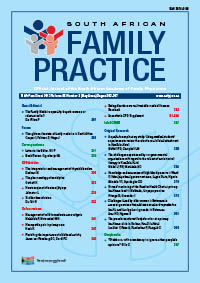Sudden loss of vision
Keywords:
Sudden loss of vision, transient visual loss, retinal vascular occlusion, vitreous haemorrhage, retinal detachment.
Abstract
Sudden loss of vision, which causes consternation for both the patient and clinician, is a clinical problem that is encountered fairly regularly in most primary healthcare settings. Sudden visual loss or obscuration which is transient may simply be a symptom of a dry eye or a migraine, but it may also be the onset of irreversible visual loss or a stroke. Most cases of sudden loss of vision are serious, require referral and have an associated underlying systemic disease. Visual loss is usually unilateral, but may be bilateral. This clinical problem may present a diagnostic challenge. No cause may be found in some instances. However, it is important to remember that the more sinister causes of sudden visual loss, such as temporal arteritis, carotid or cardiac emboli that cause retinal vascular occlusion, retinal detachment, vitreous haemorrhage and orbital masses, need to be identified early. Using the duration of the visual loss as the primary differentiating factor, with associated symptoms and signs as supplementary factors, the causes can be narrowed down. A thorough history, goal-directed examination, proper investigation and appropriate referral should enable early diagnosis and adequate management. This will prevent further ocular morbidity, and even patient mortality.
Published
2013-01-15
Section
CPD
By submitting manuscripts to SAFP, authors of original articles are assigning copyright to the South African Academy of Family Physicians. Copyright of review articles are assigned to the Publisher, Medpharm Publications (Pty) Ltd, unless otherwise specified. Authors may use their own work after publication without written permission, provided they acknowledge the original source. Individuals and academic institutions may freely copy and distribute articles published in SAFP for educational and research purposes without obtaining permission.

